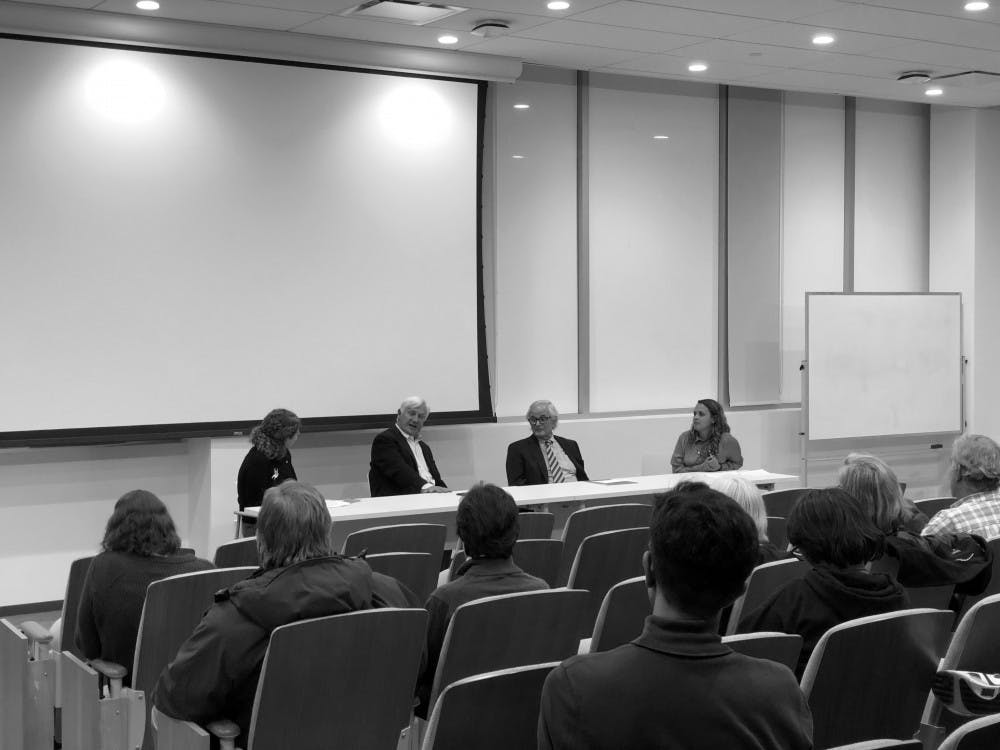Community members filed into Stephen Robert ’62 Hall for a showing and panel discussion of the documentary “Rigged: the Voter Suppression Playbook” Thursday.
The documentary examines the variety of efforts employed by conservative state legislatures from 2008-2016 to disenfranchise voters belonging to oppositional parties, as well as minority and young voters.
Audience members watched as conservative politicians gerrymandered states along racial and partisan lines with the support of conservative action groups and the use of tools like the “Red Map,” a blueprint of drawing electoral districts to benefit Republican candidates. Members of Voter Integrity Project, a conservative action group, are also shown discussing their lobbying of state legislators to implement strict new voting laws in a variety of states, such as Texas and North Carolina.
After sweeping state elections, conservative politicians carried out the goals of the conservative action groups by passing stringent voting laws, according to the documentary.
Following the documentary, a panel spoke about how the measures depicted in the documentary hurt voters from accessing ballots and diminished their electoral power. “We have young people of color … who have never been given the opportunity to vote,” said Marcela Betacur, the director of the Latino Policy Institute at Roger Williams University, who spoke on the panel.
Richard Arenberg, a senior fellow at the Watson Institute for International and Public Affairs, noted that that the federal court system played a vital role in upholding and ending the controversial voting laws discussed in the documentary. “This is of particular concern because, if you look at the record of the Supreme Court … it’s been remarkably unhelpful in instances of voter suppression that we’ve been talking about here,” he said. For instance, in June, the Supreme Court upheld the constitutionality of North Carolina’s partisanly gerrymandered state districts.
Lower federal courts also determine the constitutionality of voting rights laws. Given the importance of lower courts, “all that the Senate is doing right now is confirming judges. It’s like a conveyor belt,” Arenberg said, referencing the desire of political parties to appoint partisan judges in key seats.
During the panel, Bentacur criticized Rhode Island’s state legislature for passing its own voter ID law back in 2011, which she said made it harder for people to vote. “The big things that are taking down our democracy are happening at home, at your state legislature just five minutes away,” she said.
But while the documentary showed that the actions of state legislators affected ballot access, Tim Smith ’75, the executive director of the documentary, pointed out to the audience that “more people are voting in a higher percentage,” as evidenced by turnout during the 2018 midterm elections.
“In 2014, only 13.9 percent of (Brown) students voted. We worked hard with student partners in 2018 elections to make sure more students voted, and we just got the numbers back and found that 45 percent of students voted,” said Betsy Shimberg, the director of student development at the Swearer Center, who also spoke on the panel. Shimberg also spoke about the Swearer Center’s work with campus groups to maintain electoral participation among students by publicizing services like TurboVote, an online service that helps voters request absentee ballots, update their voter registration or register to vote.
Students shouldn’t have to worry about “really complicated absentee mail ballot applications,” Shimberg said.
Zoe Mermelstein ’21, president of the Brown Dems, also outlined some of the ways the Brown Dems are working to ensure proper representation in the state. “This semester we’re focusing on census work, which is very critical," she said, adding that one of Rhode Island's congressional seats is "at risk if populations are not counted correctly." Proper census accounts critically determine the allocation of federal funds for “welfare and public service programs,” she added. “If we can mobilize people to make sure they’re engaged in the census, we can also use this as a vehicle for get out the vote campaigns.”
Clarification: A previous version of this article quoted Zoe Mermelstein '21 as saying "it’s at risk if populations are counted correctly," without explaining the subject of the risk. In fact, the "it" she referred to is one of Rhode Island's congressional seats. Further, the correct transcription of the quote is "if populations are not counted correctly." The article has been updated to reflect those changes. The Herald regrets the errors.





